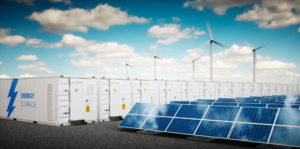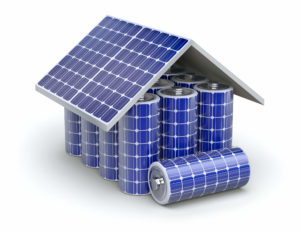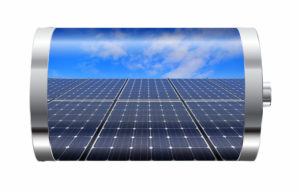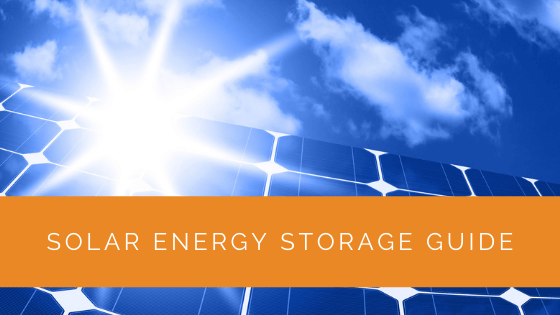A complete solar storage system has multiple components that play exclusive roles in generating electricity.
At this time, as technology moves forward, consumers have many options. Consider solar panels. You can choose from different types of such panels as per your requirement.
In the same way, solar batteries or storage banks come in different forms. Hence, it helps a consumer to have at least a basic know-how of such storage types.
With proper knowledge, you can save money by making informed choices. So, we offer this comprehensive guide to provide you vital info about the types of solar energy storage.
Contents
- 1 Key Takeaways
- 2 What is a Solar Energy Storage System?
- 3 What Are the Types of Solar Energy Storage Systems?
- 4 What Are the Types of Solar Batteries?
- 5 Which Solar Battery Should I Install?
- 6 How Does Thermal Energy Storage Work With Solar?
- 7 Frequently Asked Questions
- 8 Case Study: Optimizing Residential Solar Energy Storage with Hybrid Systems
- 9 Expert Insights From Our Solar Panel Installers About Solar Energy Storage
- 10 Experience Solar Excellence with Us!
- 11 Endnotes
Key Takeaways
- A solar energy storage system is essential to harness energy when solar panels cannot operate efficiently due to insufficient sunlight, acting as a reservoir for later use.
- Solar energy storage systems can be categorized into current-based and grid-based systems, each with its advantages and limitations.
- When choosing a solar battery, lithium-ion batteries are recommended for residential use due to their higher storage capacity and longer lifespan compared to other options.
What is a Solar Energy Storage System?
The concept of a solar energy storage system can be thought of as an extension to solar panels. Solar panels do the job of:
- Collecting solar energy in the form of sunlight
- Converting this energy into electricity via semiconductors
However, solar panels operate efficiently only in the presence of adequate sunlight. So, what happens when your area does not receive enough sunshine?
Insufficient daylight may leave the solar panel system incapable of generating electricity. But, thanks to advancing technology, we can now store excess energy in batteries.
Without a proper storage system, you become compelled to consume solar energy directly. In contrast, solar energy storage functions as a reservoir that stores solar energy for later use.
What Are the Types of Solar Energy Storage Systems?
Generally, solar energy storage is classified into:
- Current-based systems
- Grid-based systems
Current Based Solar Storage Systems
Before moving on to the details, take a look at the following table.
| Solar Storage Based on Current Type | ||
|---|---|---|
| AC (Alternating current) | DC (Direct Current) | PV (Photovoltaic) |
| Public grids | Small capacity power systems | Residence |
| High conversion losses | Low conversion losses | Low charge losses |
Solar AC Storage System
Electrical appliances often require alternating current (AC) for operation. However, PV cells generate direct current (DC).
Hence, AC storage systems convert this DC into AC. The solar inverter manages the battery and generator for this conversion.
Moreover, these systems can work with an existing PV storage unit.

Solar DC Storage System
These storage systems find extensive use in off-grid solar installations. The DC system uses a solar regulator to charge the battery.
Further, this system includes a battery inverter that converts DC into AC. Since DC storage systems have a single conversion process, they cause fewer losses.
Hence, this storage system can power DC loads quite efficiently.
Solar PV Storage System
This system uses the well-known battery storage alternative. Hence, customers can choose from many types of solar batteries for storage purposes.
The PV storage systems have better energy autonomy from a local power grid than other systems. As a result, the grid-connected PV storage model is the most preferred photovoltaic system.
Grid-Based Storage Systems
Solar storage types dependent on local power grids fall under this category. The following table summarizes all the possible configurations.
| Solar Storage Based on Current Type | ||
|---|---|---|
| Grid-tied | Off-grid | Hybrid |
| Grid-tied inverter | Self-sufficient storage | Solar battery |
| No solar battery | Multiple power sources | Less efficient |
| Cost-effective | Expensive | More components |
Solar Grid-Tied Storage System
As the name suggests, this system is dependent on the local power grid. Owners of such a storage system often install solar panels for additional benefits.
The excess energy is stored in the grid. So, you do not have to install a solar battery. However, you can opt to add a battery backup for times of power outage.
This system’s limitation is that it offers less control of the power source due to the absence of a solar battery. Nevertheless, you can avail of other benefits like net metering.
Solar Off-Grid Storage System
This storage system provides a great option if you aim to go solo. In simple words, the off-grid model includes installing batteries and generators at your place.
As this storage type is independent of the local power grid, it needs more components. Also, you need to attach other power sources for energy generation.
This storage system gives more control to the homeowner. However, you need to design a separate model and increase your budget.
Solar Grid-Hybrid Storage System
This solar storage system is a combination of the previous two types. Hence, you can avail the benefits of both the grid storage and battery backup with this one.
Looking for solar incentives and using batteries can help optimize this option. Overall, this system makes an ideal buy for most solar energy system users.
On the downside, you need to install a charge controller to protect the solar batteries, slightly increasing its cost.
What Are the Types of Solar Batteries?
You now know that solar batteries act as vital storage components of a solar energy system.
As a result, it becomes essential to know which batteries will suit your requirement.
Lithium-Ion Batteries
The batteries that run your smartphone can also store solar energy — thanks to technological advancements. Moreover, these batteries are trending due to the following reasons:
- No need for periodic maintenance
- High storage capacity
- Long lifespan
Electric current passes quickly through lithium, increasing the lifespan of lithium batteries. They also require less space than conventional solar batteries.
Moreover, these batteries are perfect for residential solar systems. However, ensure to install them safely to avoid fire hazards.
The average lifespan of lithium-ion solar batteries comes to about ten years.

Nickel-Based Solar Batteries
These solar batteries do not find extensive use in residential systems and are better-suited for industries.
Nickel-cadmium batteries are durable and withstand high temperatures. However, their toxicity limits their use.
Hence, you can mostly find nickel-based batteries in large solar power grids. The average lifespan of nickel-cadmium batteries ranges from 15 to 20 years.
Lead Batteries
These solar storage batteries are the conventional type of energy system. They are more reliable and less expensive than other batteries.
Generally, lead batteries have two subtypes:
- Flooded
- Sealed
The biggest drawback of flooded lead batteries is that they require adequate air circulation and periodic maintenance.
In addition, they have a low volume charge density. Still, due to the ease of their recyclability, these batteries suit off-grid solar systems.
The average lifespan of lead batteries lies between 5 and 10 years.
Which Solar Battery Should I Install?
You can use either lead-acid or lithium-ion batteries to store excess electricity. However, the lithium-ion battery is a better choice.
Primarily, lithium batteries can store more charge compared to lead-acid ones. Besides, you do not have to spend on the maintenance of lithium-ion batteries regularly.
However, if you are on a tight budget, traditional lead-acid batteries are good storage options too. Make sure to install them in an open space.
We do not recommend nickel-cadmium batteries for residential solar users due to their toxic nature. Moreover, the latest flow batteries are too expensive for regular users.
Hence, choose a storage alternative as per your requirement.
How Does Thermal Energy Storage Work With Solar?
Today, there are seasonal thermal energy storage facilities that store solar energy during summer. These facilities use technologies such as:
- Underground thermal energy storage
- Borehole thermal energy storage
- Aquifer thermal energy storage
- Mine-thermal energy storage
This type of solar energy storage collects heat from solar collectors for use in cold seasons.
A practical example of such a system is the solar hot water storage tank. This tank heats domestic cold water with heat energy from solar panels.
You can observe such tanks on the roof in many solar-operated houses.

Frequently Asked Questions
We have covered some FAQs in this section to clear any further doubts you may have.
Is Solar Energy Battery Storage Expensive?
A home solar battery storage can cost anywhere between $2,000 to $12,000. Significantly, this cost depends on your requirement. You can expect an approximate storage cost of $700 per kWh.
The expense of domestic solar energy storage systems varies depending on the manufacturer. However, if you want to install an off-grid storage system, investing in a durable battery would be mandatory.
What is the Cost of a 10 kW Battery?
Generally, you can expect the price of a 10 kW battery to hover around the $15,000 mark. Besides, you can buy solar kits for an overall price benefit.
A house with a functioning solar energy system is a sustainable option and provides a better resale value. Hence, investing in a reliable battery pays off in the long run.
Is Off-Grid Storage Worth It?
Off-grid systems need high initial investments. However, you can also recover this amount faster than a grid-tied system.
Thus, going off-grid offers you a long-term benefit. So, if you have the budget, we suggest you explore this option.
How Much Does an Off-Grid Solar Storage System Cost?
You can expect an off-grid solar storage system to cost between $20,000 and $70,000. The process will vary depending on your state, local contractor, and power requirement.
Case Study: Optimizing Residential Solar Energy Storage with Hybrid Systems
Background
At Solar Panels Network USA, we are committed to helping homeowners maximize their energy savings and sustainability efforts through advanced solar energy solutions. A recent project involved a client looking to enhance their existing solar setup with a robust and efficient energy storage system to ensure reliability and reduce dependency on the grid.
Project Overview
The client had a mid-sized residential property with a solar panel system already installed but lacked an effective energy storage solution. They wanted a system that could store excess solar energy for use during nighttime and cloudy days while also providing backup power during grid outages.
Implementation
After a thorough assessment of the client’s energy needs and site conditions, we recommended a hybrid solar storage system. This system would integrate a high-capacity lithium-ion battery with the existing solar panels and the local power grid.
Selection of Components:
- Lithium-Ion Battery: We chose a top-of-the-line lithium-ion battery due to its high energy density, long lifespan, and low maintenance requirements. This battery could store sufficient energy to power the home through the night and during periods of low sunlight.
- Inverter and Charge Controller: We installed a state-of-the-art inverter and charge controller to manage the flow of electricity between the solar panels, battery, and the grid efficiently.
- Monitoring System: To ensure optimal performance and provide the client with real-time data, we integrated a smart monitoring system that tracks energy production, storage levels, and consumption patterns.
Installation Process:
- Site Preparation: We began by ensuring that the battery storage area was well-ventilated and protected from extreme temperatures, which could affect battery performance.
- System Integration: The lithium-ion battery was connected to the existing solar panel system and the grid. We configured the system to prioritize the use of solar energy stored in the battery, with the grid serving as a backup source.
- Testing and Calibration: Post-installation, we conducted extensive testing to ensure all components were functioning correctly. We calibrated the system to optimize energy storage and usage, ensuring seamless switching between solar power and grid electricity when needed.
Results
The hybrid solar storage system significantly improved the client’s energy independence and efficiency. Key outcomes included:
- Increased Energy Savings: By storing excess solar energy and using it during peak hours, the client reduced their reliance on grid electricity, resulting in noticeable savings on their energy bills.
- Enhanced Reliability: The system provided a reliable backup power source during grid outages, ensuring uninterrupted power supply to essential household devices.
- Optimized Energy Usage: The smart monitoring system allowed the client to track their energy consumption patterns and make informed decisions to further enhance energy efficiency.
Summary
This case study highlights the effectiveness of hybrid solar storage systems in enhancing the performance and reliability of residential solar energy setups. By integrating a high-capacity lithium-ion battery with the existing solar panels and the local grid, we were able to provide our client with a sustainable and cost-effective energy solution. At Solar Panels Network USA, we leverage advanced technology and expert knowledge to deliver tailored solar solutions that meet our clients’ unique needs and maximize their energy savings.
Expert Insights From Our Solar Panel Installers About Solar Energy Storage
Choosing the right type of solar battery is crucial for maximizing the efficiency of your solar energy system. Lithium-ion batteries, for instance, offer high storage capacity and longevity, making them ideal for residential use.
Senior Solar Technician
Proper installation and maintenance of your solar storage system can significantly enhance its performance. Ensuring that batteries are kept in optimal conditions and regularly checking connections can prevent efficiency losses.
Lead Solar Installer
Integrating a hybrid solar storage system can provide the best of both worlds, combining the reliability of grid-tied systems with the independence of off-grid solutions. This approach can optimize energy savings and provide backup power during outages.
Solar Energy Consultant
Experience Solar Excellence with Us!
Trust in Solar Panels Network USA, where our seasoned experts deliver top-quality solar solutions for homes and businesses nationwide. With a legacy of countless successful installations and a commitment to sustainable energy, we’re your reliable partner in the solar journey. Ready for a brighter, eco-friendly future? Call us now at (855) 427-0058 and harness the power of the sun!
Endnotes
As a solar storage system user, you can either choose a power grid or go solo. Most customers prefer the hybrid solar storage option for better balance.
If you decide to buy a storage battery, a lithium-ion one is the best option at this time. Contact a reliable solar company for customized system suggestions.
About the Author
Solar Panels Network USA stands at the forefront of solar energy solutions, driven by a team of seasoned solar engineers and energy consultants. With over decades of experience in delivering high-quality solar installations and maintenance, we are committed to promoting sustainable energy through customer-centric, tailored solutions. Our articles reflect this commitment, crafted collaboratively by experts to provide accurate, up-to-date insights into solar technology, ensuring our readers are well-informed and empowered in their solar energy decisions.

